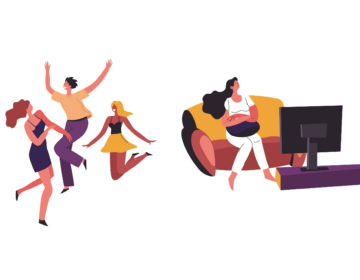What’s fueling the rise of AITA — an online community dedicated to calling out jerks?
How a subreddit dedicated to strangers’ problems taps into our human desire for fairness
Listen 11:37
Part voyeurism, part advice column, part moral philosophy — AITA is a place for debating who's right and who's wrong in everyday conflicts. (bigtunaonline / Big Stock Photo)
When Carson woke up on Christmas morning, he knew what he was getting — or so he thought.
“I was very excited,” he said. “I was telling all my friends I’d finally have a car.”
It was an important milestone for Carson, who asked that we use his first name only for privacy reasons. He was just weeks away from his 18th birthday — 18 is the official driving age in Sydney, Australia, where he and his family live.
He’d been saving up to buy his own car for years, and a few months ago, his parents had agreed to kick in for half of a used vehicle. But conversations since then had led Carson to nurture hope that they might give him a car outright for Christmas. They knew how much he wanted it — how much it would mean to him.
On Christmas morning, he woke to the sound of his younger sister screaming. He followed the sound down the stairs and out the open front door. There, he saw his sister hugging his parents and crying. Beside them was a brand new Hyundai i30, sitting beneath a giant bow.
Carson asked his parents who the car was for. They told him it was for his sister.
“I was crushed,” he said. “I didn’t know what to say, so I didn’t say anything. I just stood there for a couple of seconds and … yeah, I just couldn’t believe it. I kind of wanted to punch her, actually.”
Instead, Carson retreated to his room, but on his way, he stopped to retrieve a present with his name on it from under the tree. It was a small package, but he figured it might contain some sort of redemption. He opened it — inside was a phone case.
“That just added salt to the wound,” he said. “I just couldn’t believe that they’d bought me a phone case and they bought her [a] car. That’s the worst possible present in comparison.”
Carson raged to his friends about the injustice of it all, but it wasn’t until a few days later that he found a stage that felt as big as his fury: Am I the Asshole? (AITA).
AITA is an online forum on the website Reddit that’s dedicated to judging who’s right and who’s wrong in interpersonal conflicts.
Carson admits now that he didn’t truly believe he was the jerk in this situation. (Although even after confronting his parents, Carson says, they remained somewhat mystified about his reaction.)
“I just wanted to blow off some steam,” he said. “I guess I just wanted some reassurance that they were in the wrong.”
Carson got his reassurance — and then some. Within a few hours, his post had received thousands of upvotes (the Reddit version of “likes”) and almost 700 comments, the majority of which were outraged on Carson’s behalf.
“It really helped get through the next couple of days,” he said. “I felt much better because of the people that had reached out to me, messaged me, and just actually took an interest in the situation.”
The roots of AITA
Marc Beaulac started AITA back in 2013 for a practical reason — to help resolve a dispute that had recently divided the men and women in his office. Their beef: who got to control the thermostat.
“It’s a pretty old story that happens in a lot of offices,” Beaulac said. “I had to wear a suit every day. Other people did not have to dress so warmly, and during the summer they didn’t like the fact that the air conditioning was at what I thought was reasonable … 72.”
The women, many of whom wore skirts and sometimes sandals to work, wanted the office at a toastier temperature. But the men felt like they should just layer up and were ready to draw a line in the sand. But Beaulac was hesitant.
“I thought, am I kind of mansplaining fashion to people who have to follow rules that I’m not even aware of?” he said. “So I just kind of wanted to have somebody else outside of my social circle give me the judgment before I went ahead and blurted it out. So I went online … I asked the question, and one person found it and responded and kind of said it sounded like I was right. So the rest is history.”
The premise was simple: People would post stories about conflicts in their lives, and readers would decide if they were right or wrong. Beaulac settled on four primary ways for readers to vote: NTA (Not the A-hole), YTA (You’re The A-hole), NAH (No A-holes Here), or ESH (Everybody Sucks Here). Commenters include their reasoning along with their votes, and whichever comment receives the most votes determines the judgment.
Six years after its creation, AITA has racked up almost 2 million subscribers, and generates upwards of 700 posts every day.
Posts cover everything from profound family dramas, to spats over chores and household bills, to more unique situations — like the guy who wondered if he was a jerk for single-handedly eating 4 feet of a party sub all by himself.
But what’s most striking about AITA posts is how unremarkable they are. They’re the kinds of stories most of us have — about everyday injustices that, until recently, have remained limited to griping sessions with friends and family.
In AITA, they become fodder for discussions and judgments by a jury of thousands. In fact, AITA has one of the most active user bases on Reddit, consistently ranking fifth or sixth in terms of daily comments.
“Clearly, our subscribers are obsessed — which is great,” said Beaulac. “I mean, it’s a very compelling thing.”
The question is why. Why should we care about conflicts that are not only mundane, but involve anonymous strangers whom we’ve never met, and probably never will?
Claire, one of the 20-plus moderators for AITA — who declined to give her last name to avoid harassment by trolls — has a theory, or part of one, anyway.
“I think people are judgmental,” she said. “I think we like judging each other, and this is a space that invites you to do that.”
Commenters hail from different countries, religions, and cultures, but there’s one uniting value: fairness.
The origins of fairness
Where does our sense of fairness come from? Researchers say some of it is learned, but some seems to be innate.
“Even as early as infancy — so in the first year or two of life — children start to have expectations, or it looks as though they have expectations, that things should be divided up equally,” said Katie McAuliffe, a psychology professor at Boston College who has done more than a dozen studies on fairness.
Specifically, McAuliffe and her colleagues have done a number of studies looking at how children react to inequality — in this case, unequal divisions of candy between themselves and another child.
They found that younger children are largely content to accept more candy than their partners. But around the age of eight, something magical happens: They start turning down the extra candy, all in the name of fairness.
“This was really, really surprising, both to us and to the parents who are watching their children participate in this task,” she said. “You know, their children are throwing away four candies to prevent a partner who they’ve never met before from getting less than them.”
McAuliffe and her colleagues have performed these experiments around the world, to see if kids’ sense of fairness is culturally specific. They found that while notions of fairness may differ from place to place, its importance as a value remains.
“Fairness does seem to be a universal concept in that people across culture seem to care about fairness,” she said. “This negative response to getting less than someone seems very foundational in development, and potentially is a human universal.”
How our brains react to fairness
In fact, researchers have found that there actually seems to be a biological basis for our preference for fairness.
Golnaz Tabibnia is a neuroscientist at the University of California Irvine who’s done research on how our brains react to fairness and unfairness. She and her team took brain scans of people as they were receiving fair and unfair offers as part of a game.
“When we are treated unfairly, parts of our brain get activated that are associated with negative emotions,” she said. “So the anterior insula gets activated when we’re treated unfairly. And this part of the brain incidentally also gets activated when we see or smell or taste something disgusting.”
Until recently, it wasn’t clear whether fairness triggered its own reaction in the brain or if it was a kind of “non-feeling” status quo — simply the absence of negative feelings associated with unfairness. But in a 2008 study, Tabibnia and her colleagues found that prompted its own positive reaction.
“You see activation in the reward circuits, including the ventral striatum, and people report greater happiness,” Tabibnia said. “So there seemed to be something about fairness in and of itself, and independent of the material outcome that it’s associated with, that’s activating the reward circuit.”
These are powerful reactions — pleasure on one hand, disgust on the other — with powerful emotional implications.
“They’re quite complicated psychological states,” said Alan Sanfey, a cognitive neuroscience researcher in the Netherlands. Unfairness in particular can stir up a complicated cocktail of negative emotions.
“We know anger is a part, we know disgust is a part, and sometimes sadness can be a part,” he said. “So each of these emotions are kind of accumulated in this feeling of unfairness.”
All of which, Sanfey said, can eventually translate itself into action — specifically, conflict.
“I think if you kind of zoom out to many problems, whether they are interpersonal or even kind of intercultural, or intergovernmental, I think this may be at the heart of many of them,” he said. “This profound feeling that somebody should be treating me fairly and they’re not can drive a lot of destructive behavior.”
Witnessing fairness and unfairness
We don’t just have these reactions when we’re the direct recipients of unfair behavior — they can happen even when we’re just witnessing unfair treatment.
Researchers have found that the desire to punish perpetrators of unfair treatment extends to third-party observers — people who were unaffected by the behavior — to the point that they’re willing to bear a personal cost in order to carry out that punishment.
“In terms of brain activation, it shows a similar pattern of activation as second-party punishment,” said Tabibnia, the University of California Irvine researcher.
She said something similar could be at work among AITA’s faithful — and passionate — commenters.
“I see the parallels certainly to the point where at least observing these third-party bad behaviors is triggering something in us that’s very strong,” she said. “And I see the connection in the desire to want to incur punishment.”
Of course, we can’t exactly punish bad actors through our computer screens, but we can call them out.
“Public shaming is a hugely important cost,” said Boston College’s McAuliffe. “So reputation is extremely important to humans, both on and offline, right? And so if someone is going to attack or damage your reputation, that is certainly a cost that would be important, and you’d want to avoid incurring that cost.”
The anonymity of AITA means that public shaming doesn’t really work, at least not in any permanent way. But McAuliffe said it may still serve a similar role.
“Humans are not designed to think really in anonymous ways,” she said.
As a result, we could be applying real-world rules to anonymous, online situations.
“That’s what makes them feel very raw and very real,” she said. “Even though, if you take a sort of step back and a very logical approach to it, you can say like, ‘Hey, look, this is anonymous. It doesn’t actually matter,’ it’s hard to turn off that psychology that has evolved over millions of years.”
The real reason we care about fairness
So what does all this say about the appeal of AITA? What prompted the wave of support for Carson and his disappointing Christmas? Or the universal disgust for the guy who ate 4 feet of a six-foot party sub all by himself? Or the outrage in response to the unequal division of wedding funds for two adult daughters?
Katie McAuliffe said our collective desire to punish bad actors — even ones we don’t know, and will never meet — is evidence of how much we value fairness as an idea.
“I think that this really speaks to this idea that the fairness norm itself is so privileged in our society,” she said. “And it’s important that we not only uphold that norm when we’re the victim of unfairness, but [also] when we see anyone as the victim of unfairness, because we need to make sure that this norm is upheld for everyone’s benefit in a sense.”
McAuliffe said fairness is important not only because we value things like justice and equality, but because it has a real practical purpose: fostering cooperation.
“Human cooperation is so essential, right? To our — our everything,” she said. “Like our whole entire society is based on cooperation, so we can achieve more together than we can achieve alone. And fairness gives us a way of making sure that those relationships remain productive and they can help protect us from working with bad partners essentially.”
Golnaz Tabibnia said fairness could contribute to our success as a species in another way, too.
“Fairness, I would say, is desirable because we are social animals, and our survival depends on our social connectedness,” she said. “Some scientists have argued that social affiliation satisfies a basic human need, basically the need to belong and the need to feel accepted or be accepted, because when we’re treated fairly, it’s a signal that we’re valued, that our concerns matter to others.”
WHYY is your source for fact-based, in-depth journalism and information. As a nonprofit organization, we rely on financial support from readers like you. Please give today.







